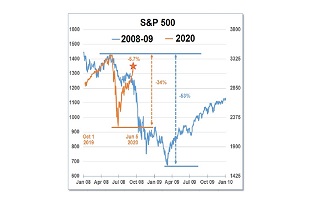COVID-19 Economic Impact
As a profession, the world of economics has steadfastly refused to discipline itself. However, the global pandemic, COVID-19, is having a major impact on economic thought and, grudgingly, is transforming economic life worldwide. As El-Erian says, “…the profession has no choice but to leave its comfort zone.”
COVID-19 is devastating world economies, perhaps changing some of them, if not forever, then at least for a very long time. As such, economic thinking must change and adapt to these new realities and, the sooner that happens, the better will be the analysis and thought-process that influences policy response.
Government Responses
 What form will that response take? Right now, world governments and associated central banks are fixated on mitigating the forth-coming global down-turn in an effort to ward off the negative effects of a recession and ensuring economies do not sink into a depression. (A recession is two consecutive quarters of negative changes in GDP, and a depression is an annual decline in GDP growth of at least 10%.)
What form will that response take? Right now, world governments and associated central banks are fixated on mitigating the forth-coming global down-turn in an effort to ward off the negative effects of a recession and ensuring economies do not sink into a depression. (A recession is two consecutive quarters of negative changes in GDP, and a depression is an annual decline in GDP growth of at least 10%.)
These efforts within the current pandemic world likely will cause a further loss of distinction between mainstream economics in advanced economies and those experienced in developing economies. The “rules of order” within our newly-formed pandemic economies require consumers to stay at home, and thus not be able to spend to the same degree as previously, and retailers who cannot reach their customers or who are cut off from their suppliers and, therefore, have little to sell even if they could.
Health of Citizens
The most important concern for government at the moment is for the health of its citizens. The requirements for self-isolation and “social distancing” or “physical distancing” are having devastating effects on economic activity. The severity and duration of the coming recession may well depend on the success of the health-policy response.

Outside one’s comfort zone, people tend to panic which, in turn, often causes even greater economic disruption. Tightening liquidity conditions can lead to panic-selling, which usually decreases inherent value even further. This can lead to what El-Erian calls “wholesale financial liquidation”. This can threaten the efficient functioning of markets.
El-Erian goes on to discuss the “economics of circuit-breakers”. He states that it is incumbent on world leaders and central bankers to implement circuit breakers that can limit the scope of dangerous economic and financial reactions. As such, cash transfers, interest-free loans, and corporate bail-outs will become increasingly likely. But, on what terms? Government assistance cannot become politicized or poorly designed. Government intervention must be carefully crafted.
Economic policies in a pandemic world will require continuing economic research, and researchers in advanced economies are likely to find themselves interfacing with researchers in developing economies. El-Erian concludes that “Insofar as they adopt insights from both domains, economics will be better for it.”
Published March 26, 2020, you can read the entire article here: Pandemic Economics
//






